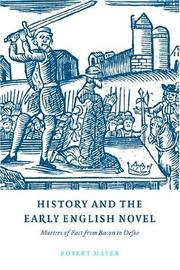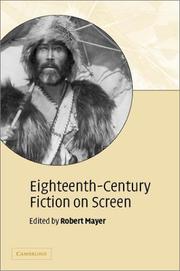| Listing 1 - 10 of 70 | << page >> |
Sort by
|

ISBN: 0521563771 0521604478 0511089767 0511582064 051100088X 0585131090 9780585131092 9780511000881 9780521563772 9780511582066 9780521604475 Year: 1997 Volume: 33 Publisher: Cambridge Cambridge University Press
Abstract | Keywords | Export | Availability | Bookmark
 Loading...
Loading...Choose an application
- Reference Manager
- EndNote
- RefWorks (Direct export to RefWorks)
This new study of the origins of the English novel argues that the novel emerged from historical writing. Examining historical writers and forms frequently neglected by earlier scholars, Robert Mayer shows that in the seventeenth century historical discourse embraced not only 'history' in its modern sense, but also fiction, polemic, gossip, and marvels. Mayer thus explains why Defoe's narratives were initially read as history. It is the acceptance of the claims to historicity, the study argues, that differentiates Defoe's fictions from those of writers like Thomas Deloney and Aphra Behn, important writers who nevertheless have figured less prominently than Defoe in discussions of the novel. Mayer ends by exploring the theoretical implications of the history-fiction connection. His study makes an important contribution to the continuing debate about the emergence of what we now call the novel in Britain in the eighteenth century.
Fiction --- English literature --- anno 1700-1799 --- English fiction --- 18th century --- History and criticism --- Historical fiction [English ] --- Literature and history --- Great Britain --- History --- Literature and history - Great Britain - History - 18th century. --- Arts and Humanities --- Literature --- Historical fiction, English --- History and criticism. --- Defoe, Daniel, --- Bacon, Francis, --- Knowledge --- History. --- Influence.
Book
Year: 1943 Publisher: Wien : Hölder-Pichler-Tempsky,
Abstract | Keywords | Export | Availability | Bookmark
 Loading...
Loading...Choose an application
- Reference Manager
- EndNote
- RefWorks (Direct export to RefWorks)
Book
Year: 1903
Abstract | Keywords | Export | Availability | Bookmark
 Loading...
Loading...Choose an application
- Reference Manager
- EndNote
- RefWorks (Direct export to RefWorks)
Book
Year: 1940 Publisher: Wien : Deuticke,
Abstract | Keywords | Export | Availability | Bookmark
 Loading...
Loading...Choose an application
- Reference Manager
- EndNote
- RefWorks (Direct export to RefWorks)
Book
ISBN: 9780198794820 0198794827 Year: 2017 Publisher: Oxford, United Kingdom : Oxford University Press,
Abstract | Keywords | Export | Availability | Bookmark
 Loading...
Loading...Choose an application
- Reference Manager
- EndNote
- RefWorks (Direct export to RefWorks)
Walter Scott and Fame is a study of correspondences between Scott and socially and culturally diverse readers of his work in the English-speaking world in the early nineteenth century. Examining authorship, reading, and fame, the book is based on extensive archival research, especially in the collection of letters to Scott in the National Library of Scotland. Robert Mayer demonstrates that in Scott's literary correspondence constructions of authorship, reading strategies, and versions of fame are posited, even theorized. Scott's reader-correspondents invest him with power but they also attempt to tap into or appropriate some of his authority. Scott's version of authorship sets him apart from important contemporaries like Wordsworth and Byron, who adhered, at least as Scott viewed the matter, to a rarefied conception of the writer as someone possessed of extraordinary power. The idea of the author put in place by Scott in dialogue with his readers establishes him as a powerful figure who is nevertheless subject to the will of his audience. Scott's literary correspondence also demonstrates that the reader can be a very powerful figure and that we should regard reading not just as the reception of texts but also as the apprehension of an author-function.
Scott, Walter, --- Scott, Walter, --- Criticism and interpretation.

ISBN: 0521793165 Year: 2002 Publisher: Cambridge Cambridge University Press
Abstract | Keywords | Export | Availability | Bookmark
 Loading...
Loading...Choose an application
- Reference Manager
- EndNote
- RefWorks (Direct export to RefWorks)
Film --- Literature --- anno 1700-1799
Book
Year: 1963 Publisher: Evanston published by The Instrumentalist Company
Abstract | Keywords | Export | Availability | Bookmark
 Loading...
Loading...Choose an application
- Reference Manager
- EndNote
- RefWorks (Direct export to RefWorks)
Book
Year: 1943 Publisher: Wien Hölder-Pichler-Tempsky
Abstract | Keywords | Export | Availability | Bookmark
 Loading...
Loading...Choose an application
- Reference Manager
- EndNote
- RefWorks (Direct export to RefWorks)
Book
Year: 1971 Publisher: Göttingen [s.n.]
Abstract | Keywords | Export | Availability | Bookmark
 Loading...
Loading...Choose an application
- Reference Manager
- EndNote
- RefWorks (Direct export to RefWorks)

ISBN: 276051126X 2760511278 9782760511262 Year: 2003 Publisher: Sainte-Foy: Presses de l'Université du Québec,
Abstract | Keywords | Export | Availability | Bookmark
 Loading...
Loading...Choose an application
- Reference Manager
- EndNote
- RefWorks (Direct export to RefWorks)
Social problems --- Social service --- Social policy --- Social networks --- Problèmes sociaux --- Service social --- Politique sociale --- Réseaux sociaux --- Case studies --- Evaluation --- Cas, Etudes de --- Research --- Problèmes sociaux --- Réseaux sociaux --- Case studies. --- Social problems - Research --- Social problems - Case studies
| Listing 1 - 10 of 70 | << page >> |
Sort by
|

 Search
Search Feedback
Feedback About UniCat
About UniCat  Help
Help News
News